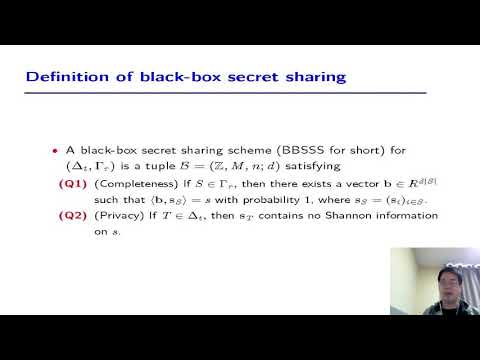CryptoDB
Blackbox Secret Sharing Revisited: A Coding-Theoretic Approach with Application to Expansionless Near-Threshold Schemes
| Authors: |
- Ronald Cramer , CWI, Netherlands
- Chaoping Xing , Shanghai Jiaotong University, Shanghai, China
|
| Download: |
- DOI: 10.1007/978-3-030-45721-1_18
(login may be required)
- Search ePrint
- Search Google
|
|
Conference:
|
EUROCRYPT 2020
|
| Abstract: |
A {\em blackbox} secret sharing (BBSS) scheme works
in exactly the same way for all finite Abelian groups $G$; it can be instantiated for any such group $G$ and {\em only} black-box access to its group operations and to random group elements is required. A secret is a single group element and each of the $n$ players' shares is a vector of such elements. Share-computation and secret-reconstruction is by integer linear combinations. These do not depend on $G$, and neither do the privacy and reconstruction parameters $t,r$. This classical, fundamental primitive was introduced by Desmedt and Frankel (CRYPTO 1989) in their context of ``threshold cryptography.'' The expansion factor is the total number of group elements in a full sharing divided by $n$. For threshold BBSS with $t$-privacy ($1\leq t \leq n-1$), $t+1$-reconstruction and arbitrary $n$, constructions with minimal expansion $O(\log n)$ exist
(CRYPTO 2002, 2005).
These results are firmly rooted in number theory; each makes
(different) judicious choices of orders in number fields admitting
a vector of elements of very large length (in the number field degree) whose corresponding Vandermonde-determinant is sufficiently controlled
so as to enable BBSS by a suitable adaptation of Shamir's scheme.
Alternative approaches generally lead to very large expansion.
The state of the art of BBSS has not changed for the last 15 years.
Our contributions are two-fold.
(1) We introduce a novel, nontrivial, effective construction of BBSS based on {\em coding theory}
instead of number theory.
For threshold-BBSS we also achieve minimal expansion factor $O(\log n)$.
(2) Our method is more versatile. Namely, we show, for the first time, BBSS that is {\em near-threshold}, i.e.,
$r-t$ is an arbitrarily small
constant fraction of $n$, {\em and} that has expansion factor~$O(1)$, i.e.,
individual share-vectors of {\em constant} length (``asymptotically expansionless''). Threshold can be concentrated essentially freely
across full range. We also show expansion is minimal for near-threshold and that such BBSS cannot be attained by previous methods.
Our general construction is based on a well-known mathematical principle, the local-global principle. More precisely, we first construct BBSS over local rings through either Reed-Solomon or algebraic geometry codes. We then ``glue'' these schemes together in a dedicated manner to obtain a global secret sharing scheme, i.e., defined over the integers, which, as we finally prove using novel insights, has the desired BBSS properties. Though our main purpose here is advancing BBSS for its own sake, we also briefly address possible protocol applications. |
Video from EUROCRYPT 2020
BibTeX
@inproceedings{eurocrypt-2020-30181,
title={Blackbox Secret Sharing Revisited: A Coding-Theoretic Approach with Application to Expansionless Near-Threshold Schemes},
booktitle={39th Annual International Conference on the Theory and Applications of Cryptographic Techniques, Zagreb, Croatia, May 10–14, 2020, Proceedings},
series={Lecture Notes in Computer Science},
publisher={Springer},
keywords={foundations of secret sharing;blackbox secret sharing},
volume={12105},
doi={10.1007/978-3-030-45721-1_18},
author={Ronald Cramer and Chaoping Xing},
year=2020
}

